|
|
|
Sort Order |
|
|
|
Items / Page
|
|
|
|
|
|
|
| Srl | Item |
| 1 |
ID:
192960
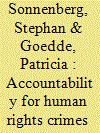

|
|
|
|
|
| Summary/Abstract |
This article explores how claims alleging serious human rights violations or breaches of international criminal law that occurred in the Democratic People's Republic of Korea (DPRK or North Korea) might unfold in the courts of the Republic of Korea (ROK or South Korea) under various differing jurisdictional theories. South Korea has legislation allowing for the exercise of universal jurisdiction, an increasingly widespread judicial mechanism for a national court to hold alleged perpetrators of serious human rights and humanitarian law violations accountable for their actions regardless of where the crime was committed and regardless of the victim's or the perpetrator's nationality. In South Korea, domestic criminal and civil jurisdiction can conceivably be "stretched" to encompass crimes perpetrated on the northern half of the Korean peninsula due to a constitutional provision that denies the existence of a separate North Korean sovereign nation. This article introduces and compares the feasibility and challenges of various jurisdictional approaches in South Korea that could address human rights crimes in North Korea, specifically (a) universal jurisdiction prosecution based on domestic law, (b) domestic criminal prosecution, and (c) civil cases in tort.
|
|
|
|
|
|
|
|
|
|
|
|
|
|
|
|
| 2 |
ID:
157934
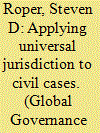

|
|
|
|
|
| Summary/Abstract |
The principle of universal jurisdiction allows a state to exercise jurisdiction over a category of cases when the state has no connection by territory, nationality, or other interest with the parties. While the concept of universal jurisdiction is not new, it has been almost exclusively applied to criminal matters. There has been relatively little focus on the application of universal jurisdiction in the civil sphere as a means for victims to seek judgments and compensation for serious violations of human rights. This article examines the theoretical distinction made by courts in the application of universal jurisdiction to civil cases and explores why the emerging norm of universal jurisdiction has been focused almost exclusively on criminal matters. The article surveys the status of universal civil jurisdiction in US and European courts, examines how jurisdiction is limited by courts, and assesses the arguments for and against a civil basis of universal jurisdiction.
|
|
|
|
|
|
|
|
|
|
|
|
|
|
|
|
| 3 |
ID:
160198
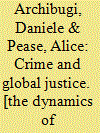

|
|
|
|
|
| Publication |
Cambridge, Polity Press, 2018.
|
| Description |
xxi, 238p.: tables, figurespbk
|
| Standard Number |
9781509512621
|
|
|
|
|
|
|
|
|
|
|
|
Copies: C:1/I:0,R:0,Q:0
Circulation
| Accession# | Call# | Current Location | Status | Policy | Location |
| 059463 | 345.0773/ARC 059463 | Main | On Shelf | General | |
|
|
|
|
| 4 |
ID:
170428
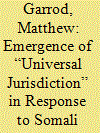

|
|
|
|
|
| Summary/Abstract |
Since the 1980s, the idea that piracy is the “original” and “paradigmatic” universal jurisdiction crime in customary international law has been increasingly supported by weighty scholarship. In the wake of the unprecedented surge in Somali piracy, this view is gaining ground among various powerful actors in international law. Yet, remarkably little empirically grounded scholarship exists in support of universal jurisdiction. This Article provides the first comprehensive empirical analysis of state practice in response to Somali piracy in a ten-year period since 2006. Additionally, the data on Somali piracy are compared with the empirical findings of state practice regarding international crimes, which are more “heinous” than piracy, since the end of World War II to 2016. In so doing, this Article brings new insight and the first thorough critique of what most scholars, governments, the UN and even the International Court of Justice have said on universal jurisdiction, its purpose and the basis for it in international law. In view of inter-state tensions and conflict caused by universal jurisdiction and a move towards law codification, there is now a pressing need for a paradigm shift in the concept of universal jurisdiction for both piracy and international crimes, a step away from conventional scholarly accounts, and the grand narratives from which they proceed, to a position that has a solid basis in the actual practice of states. Empirically and historically informed, it is proposed that “universal jurisdiction” for both categories of crime provides a basis in international law permitting the exercise of national criminal jurisdiction over offences involving foreign nationals abroad that have a close nexus between the case over which jurisdiction is asserted and the state asserting jurisdiction. Common and traditionally held assumptions that universal jurisdiction is based solely on the grave nature of crimes and is applied by states absent any nexus to offences and in the interest of the international community are unfounded.
|
|
|
|
|
|
|
|
|
|
|
|
|
|
|
|
| 5 |
ID:
170261
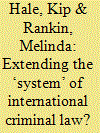

|
|
|
|
|
| Summary/Abstract |
Despite its short life of 16 years, the International Criminal Court (‘ICC’ or ‘Court’) is no stranger to controversy. Indeed, contestation started before the ICC began operations. Throughout the drafting the Rome Statue, the ICC's founding treaty, states such as Germany argued vehemently for the ICC to be granted universal jurisdiction, while the permanent five members of the United Nations Security Council (‘UNSC’ or ‘Council’) remained reticent to relinquish full jurisdiction over the core international crimes (Eikel 2018), including war crimes, crimes against humanity, and genocide (collectively ‘atrocity crimes’). Even after the Rome Statute was passed and the ICC was founded, albeit without universal jurisdiction, it remained embattled. Not only was it criticised for its ineptness at the early stages of its establishment, the Court continued to be condemned for its lack of involvement in global hotspots outside its jurisdiction. For instance, despite being described as the worst humanitarian disaster since the Second World War (Al Hussein 2017), the ICC does not have jurisdiction over alleged atrocity crimes in Syria – namely, because Syria is not a State Party to the Rome Statute, but also because Russia and China as permanent members of the UNSC have blocked attempts to refer it to the ICC.
|
|
|
|
|
|
|
|
|
|
|
|
|
|
|
|
| 6 |
ID:
105868


|
|
|
|
|
| Publication |
2011.
|
| Summary/Abstract |
One of the surprising things about the resurgence of piracy in the Gulf of Aden is that there is not yet a clear standard of conduct when suspected pirates are eventually caught. There are many cases in which pirates have been released by the military navies that arrested them and other cases of excessive use of force. This article addresses the possibility of providing a fair trial to suspected pirates, also on the ground of new developments in establishing dedicated courts in states of the region. Judging suspected pirates presents a variety of problems associated to evidence collection, availability of witnesses and national laws to be applied. In spite of these difficulties, Western powers, which have invested so much in patrolling the Indian Ocean with their navies, have so far been unexpectedly reluctant to provide fair trials.
|
|
|
|
|
|
|
|
|
|
|
|
|
|
|
|
| 7 |
ID:
132410
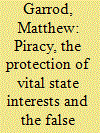

|
|
|
|
|
| Publication |
2014.
|
| Summary/Abstract |
It is widely asserted by courts and in legal scholarship that for hundreds of years universal jurisdiction has applied to the crime of piracy. However, the alleged historical legal foundations of universality need challenge. The central argument of this analysis is that jurisdiction over "piracy" is better understood under the protective principle, which arose out of the necessity of maritime Powers roughly between the seventeenth and eighteenth centuries to protect certain of their vital interests, not least their overseas trade routes and colonial trade and settlements. It follows that there is a need to re-conceptualise jurisdiction over piracy as the protection of vital State interests shared by the international community, a concept misinterpreted as universal jurisdiction.
|
|
|
|
|
|
|
|
|
|
|
|
|
|
|
|
| 8 |
ID:
116549
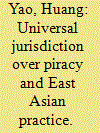

|
|
|
|
|
| Publication |
2012.
|
| Summary/Abstract |
In recent years, the UN Security Council and General Assembly resolutions on piracy repeatedly reiterated the use of universal jurisdiction to combat piracy. This article expounds the conceptual and application limitations of universal jurisdiction over piracy, and, from the three dimensions of universal jurisdiction (prescription, enforcement and adjudication), examines the relevant practice in East Asia. The author finds that universal jurisdiction is an indispensable tool in deterring, preventing and responding to pirate attacks, and that the implementation of universal jurisdiction in East Asia should be strengthened in the future by, among others, reforming domestic law to criminalize piracy and establish universal jurisdiction and by enhancing co-operation in prosecuting pirates, as well as by further advancing comprehensive and in-depth co-operation in law enforcement.
|
|
|
|
|
|
|
|
|
|
|
|
|
|
|
|
|
|
|
|
|